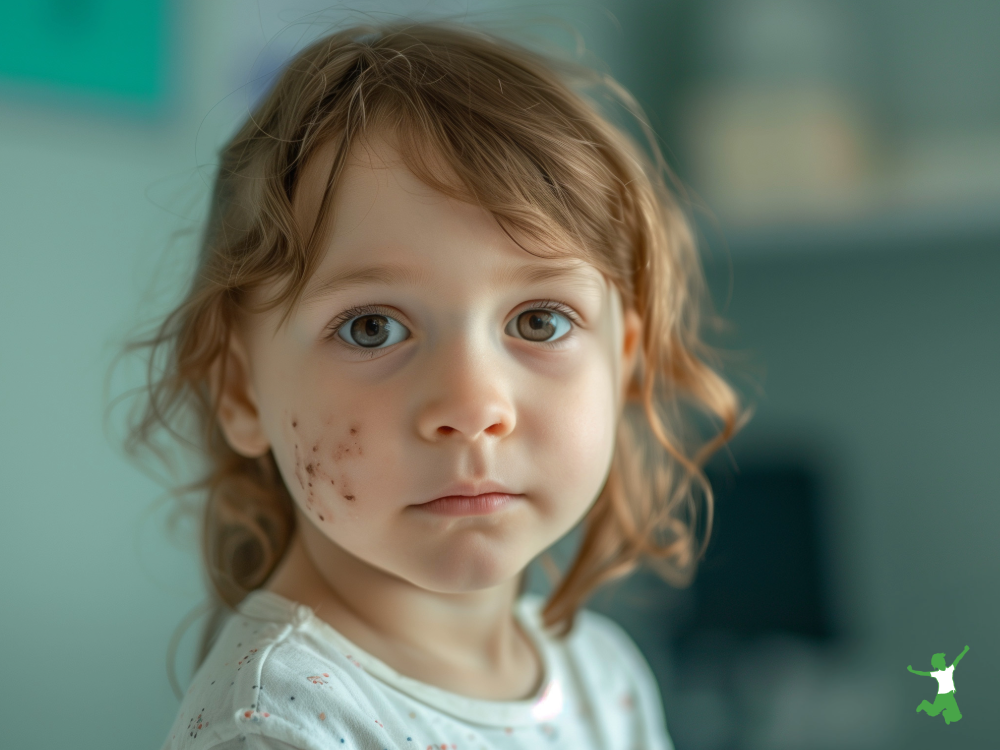Table of Contents[Hide][Show]
How to resolve impetigo at home naturally without a visit to the doctor for (you guessed it) a script for antibiotics.

Impetigo is a common skin infection that most often strikes babies and young children.
Outbreaks occur most frequently during summer months when the air is warm and humid, but it is possible for the infection to strike even during cooler and drier times of year.
Impetigo is typified by reddish sores on the face and/or the feet and hands. (1)
The unsightly sores burst into honey-colored scabs after about a week.
Conventional Treatment
As you might have expected, the standard conventional treatment for impetigo is a prescription for strong (mupirocin) antibiotic ointment.
If there are more than just a few sores present, the doctor may also prescribe an internal antibiotic as well. (2)
Do doctors have any tools in the toolbox other than drugs and surgery?
Sadly, it appears they do not!
For a parent wishing to avoid gut and skin flora stripping meds, it is up to you to do your own research!
Home Remedy for Impetigo
Fortunately, treating impetigo at home is quite an easy task!
You may even wish to skip the doctor’s visit entirely (I certainly would if it was me!).
Of course, I am NOT a doctor and this is NOT medical advice, but here’s how to take care of it at home yourself.
This is friendly advice from lil’ ole me…who successfully raised three children who are now adults without a single round of antibiotics.
In this toxic pill-popping culture of ours, I consider this one of my life’s greatest achievements that shows that it definitely CAN be done!
External Treatment
Every parent wishing to break the cycle of health-destroying antibiotics for their children really needs to know that the allicin in garlic is the most potent natural antibiotic there is.
It selectively targets pathogens, leaving any good microbes alone (unlike colloidal silver and others touted in the alternative health community).
To treat impetigo externally, simply blend the following solution in a small glass bottle or bowl: (3)
- 3 regular strength Allimax capsules (180 mg each)
- 18 drops of filtered water
- Mix well
- Apply 2 drops to the affected area, 4X per day until the infection subsides.
- Refrigerate the liquid between treatments to maintain potency.
- Mix up a new batch of solution as needed.
If you prefer to buy allicin-infused liquid instead of making it yourself (more cost-effective), you can buy it here.
That’s it!
Internal Remedy
If the impetigo infection is severe, treating internally as well as externally is probably a wise move.
The suggested dose is 4 allimax capsules per day in a divided dose (2 am/2 pm). (4)
To avoid stomach upset (allicin is a strong form of sulfur), it is suggested to take the capsules with a meal.
If the child cannot swallow small capsules yet, you can take drops from the solution above internally as well (just mix up more if needed).
Six drops equates to 1 allimax capsule (180 mg of allicin).
Note: Using raw garlic will not be as effective. A single allimax capsule contains roughly the same amount of allicin as over two dozen garlic cloves!
Should Everyone in the Home Be Treated?
The commonly accepted school of thought is that friends and family who have come into contact with a child who has impetigo should all be treated to prevent the “spread” of the infection.
However, my approach is to only treat those with an active infection.
I call it the “do nothing approach” to illness that I learned from my country doctor Dad.
In a nutshell, adopting a “wait and see” approach gives the immune system the opportunity to strengthen and get stronger in the presence of a challenge.
This is why children who play outdoors barefoot in (unsprayed) grass and dirt have far stronger immune systems than children who play inside in sterile environments.
It is also why children who drink raw milk have stronger immunity than children raised on sterilized, pasteurized milk.
(1) Impetigo Overview. The Mayo Clinic
(2) Impetigo Diagnosis and Treatment. The Mayo Clinic
(3, 4) Natural Antibiotics Dosing Chart

